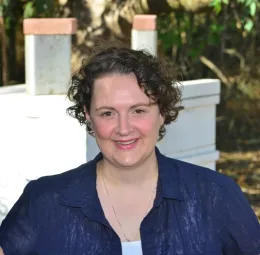
In partnership with the UC Davis-based Western Institute for Food Safety and Security (WIFSS), UC Davis Department of Entomology and Nematology, and Oregon State University, the USDA's Specialty Crop Multi-State Program is funding the grant to support food safety and honey bee health through veterinary education. WIFSS is associated with the School of Veterinary Medicine and the College of Agricultural and Environmental Sciences.
Joining Niño on the project are two School of Veterinary affiliates, project leader Bennie Osburn, former dean of the School of Veterinary Medicine, and collaborator Jonathan Dear, assistant professor of clinical medicine and epidemiology, Department of Medicine and Epidemiology; and state partner collaborator Ramesh Sagili, associate professor at Oregon State University.

“California regulations stipulate that veterinarians participate in continuing education that addresses antimicrobial stewardship,” commented Dear. “The Veterinary Feed Directive that's at the heart of the new interaction between veterinarians and beekeepers is all part of this renewed emphasis on stewardship.”
The nearly $500,000 grant is part of $7 million in funding announced April 30 to support 11 projects in six states to develop solutions to challenges affecting the specialty crop industries that cross state boundaries. The Specialty Crop Multi-State Program manages the grants, which are administered by the Agricultural Marketing Service.
“Honey bees play a dual role in the production of specialty crops,” Niño wrote in the abstract. “They produce honey, classified as a specialty crop, and they are the primary managed pollinators for a majority of high value specialty crops grown in the contiguous states of California and Oregon. Currently, annual colony losses are unacceptably high due to a variety of environmental and biological causes including bacterial diseases. Historically, beekeepers have self-prescribed antibiotics to control these diseases. However, the Food and Drug Administration and the State of California have taken steps to address antibiotic resistance and antimicrobial use in the feed or water of food-producing animals.


Osburn and Dear noted that “Currently, veterinary schools are lagging in adopting curricula focused on apiculture. This project will offer a comprehensive bee biology online course and train-the-trainer practical training for veterinarians and apiculture educators with the ultimate goal of supporting safety and security of specialty crops that depend on honey bees for production.”
The WIFSS mission “is to serve the global community by conducting research, developing training, and providing outreach programs that will enhance the health and security of people, animals, and the environment.”
In announcing the funding, USDA Under Secretary for Marketing and Regulatory Programs Greg Ibach said: “The best way to tackle many of the biggest challenges in food safety and to promote markets is to make it easier for a lot of stakeholders to work together. USDA's Specialty Crop Multi-State Program provides the grease to help them leverage state and private sector resources across state lines—especially the knowledge and experience of farmers and the agricultural industry.”
Ibach said SCMP strengthens food safety; seeks new ways to address plant pests, disease, and other crop-specific issues; and increases marketing opportunities for specialty crops—fruits, vegetables, tree nuts and dried fruits to horticulture and nursery crops, including floriculture. USDA competitively awards funds to state departments of agriculture that partner with stakeholder organizations in two or more states.
Among the other awards announced:
- The University of California and Oregon State University for a pest and plant health project to optimize phasmarhabditis nematodes for mitigating invasive gastropods in the western United States. Awarded $770,356.
- USDA's Agricultural Research Service, Washington State University and the University of California, Davis for a pest and plant health project to better understand esca trunk disease in multiple grape-production systems.Awarded $348,991.

